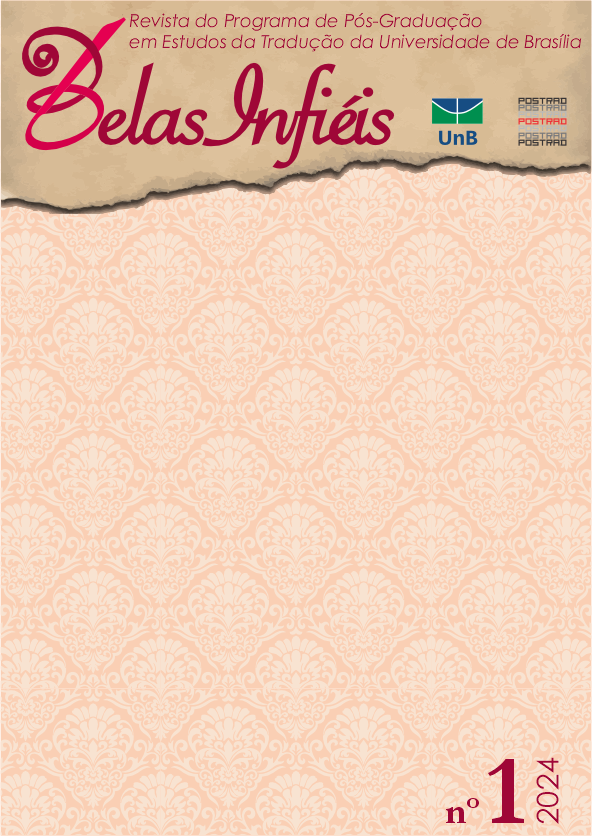The Universal and the Exotic in the Reception of Rewritings and Translations of Grande Sertão: Veredas in Germany
DOI:
https://doi.org/10.26512/belasinfieis.v13.n1.2024.51045Keywords:
Translation Studies. Literary translation. Rewriting. Retranslation. Guimarães Rosa.Abstract
This article aims to investigate some of the processes of rewriting and retranslation that João Guimarães Rosa's novel, Grande Sertão: Veredas (1956), has undergone and is undergoing, with a focus on the reception of the translations of the book into German and on statements of the actors involved in the different rewriting processes analyzed. The analysis will be based on André Lefevere's (1992) elaborations on rewriting and Álvaro Faleiros and Thiago Mattos's (2017) elaborations on retranslation. The study starts with the thesis of Grande Sertão: Veredas (1956) as a critical rewriting of Os Sertões (1902), by Euclides da Cunha, the first translation into German, Grande Sertão: Roman (1964), by Curt Meyer-Clason, and the retranslation project - not yet finalized - by Berthold Zilly. During this course, it is proposed an analysis of the rewritings of Grande Sertão: Veredas as manipulations that can motivate readings of the work from a more exotic or universal point of view. The study begins with the more exoticizing view of the sertão and its people, present in Os Sertões; moves on to the more universal dimension given to the sertão in Grande Sertão: Veredas; up to Meyer-Clason's first translation, seen again as leaning towards exoticism; and concludes with Zilly's retranslation, which even before its publication can already be seen as a more universal rewriting.
Downloads
References
Barbosa, F. L. C. (2010). Leituras de Grande sertão: veredas:* sua tradução alemã e a correspondência de Guimarães Rosa com seu tradutor alemão Curt Meyer-Clason. Signótica, 22(1), 57–68. https://doi.org/10.5216/sig.v22i1.12722
Bolle, W. (2004). Grandesertão.br: O romance de formação do Brasil. Editora 34.
Bonomo, D. R. (2010). A biblioteca alemã de João Guimarães Rosa. Pandaemonium Germanicum, (16), 155-183. https://doi.org/10.1590/S1982-88372010000200008
Esteves, B. (2012). O jagunço de Munique. Revista Piauí, (67). https://piaui.folha.uol.com.br/materia/o-jagunco-de-munique/
Faleiros, A., Mattos, T. (2017). A retradução de poetas franceses no Brasil: de Lamartine a Prévert. Rafael Copetti Editor.
Fernando Graça. (8 de dezembro, 2016). Guimarães Rosa - Entrevista raríssima em Berlim (1962) [Vídeo]. Youtube. https://www.youtube.com/watch?v=ndsNFE6SP68&ab_channel=FernandoGra%C3% A7a
Itaú Cultural. (23 de março, 2019). Berthold Zilly - Conexões Itaú Cultural (2008) - Parte 2/3 [Vídeo]. Youtube. https://www.youtube.com/watch?v=Iaq3hoyRuLM&ab_channel=Ita%C3%BACultur al
Kutzenberger, S. (2005). Europa in Grande Sertão: Veredas / Grande Sertão: Veredas in Europa. Editions Rodopi B.V.
Lapelusp. (22 de maio, 2013). Grande Sertão Veredas em Alemão - Palestra de Berthold Zilly [Vídeo]. Youtube. https://www.youtube.com/watch?v=wr7im4vl- AU&ab_channel=lapelusp
Lefevere, A. (1992). Translation, Rewriting, & the Manipulation of Literary Fame. Routledge.
Professor voluntário da UFSC recebe prêmio de tradução na Suíça. (6 de julho, 2019). Notícias da UFSC. Recuperado em 19 de Maio, 2023, em https://noticias.ufsc.br/2019/07/professor-voluntario-da-ufsc-recebe-premio-de- traducao-na-suica/
Rebinski Junior, L. (17 de dezembro, 2012). Especial Capa: Grande sertão alemão. Cândido. https://www.bpp.pr.gov.br/Candido/Pagina/Especial-Capa-Grande-sertao-alemao
Rosenfield, K. (2020). Quecksilbersachen: J.G. Rosa und Curt Meyer-Clason. In: Ette, O., Soethe, P. A. (Eds.), Guimarães Rosa und Meyer-Clason: Literatur, Demokratie, Zusammenlebenswissen. (pp. 247-267). De Gruyter. https://doi.org/10.1515/9783110677713
Thorau, H. (2010). Rezeption mit Rezept: Wie brasilianisches Theater deutsches Theater animiert. In: Bader, W. (Ed.). Deutsch-brasilianische Kulturbeziehungen: Bestandsaufnahme, Herausforderungen, Perspektiven. (pp. 155-170). Vervuert Verlag.
Vejmelka, M. (2008). A Obra de Jorge Amado nas Alemanhas Oriental e Ocidental: suas recepções e traduções. Casa de Palavras.
Ventura, R. (1996). Euclides da Cunha e a República. Estudos Avançados, 10(26), 275-291. https://doi.org/10.1590/S0103-40141996000100024
Zilly, B. (2000). O tradutor implícito. Considerações acerca da translingualidade de Os Sertões. Revista USP, (45), 85-105. https://doi.org/10.11606/issn.2316-9036.v0i45p85-105
Zilly, B. (2017). “Procuro chocar e estranhar o leitor”. Grande Sertão: Veredas – A poética da criação e da tradução. FronteiraZ. Revista Do Programa De Estudos Pós-Graduados Em Literatura E Crítica Literária, (19), 4-31. https://doi.org/10.23925/1983- 4373.2017i19p4-31
Downloads
Published
How to Cite
Issue
Section
License
Copyright (c) 2024 CC BY

This work is licensed under a Creative Commons Attribution 4.0 International License.
Given the public access to this journal, the texts are free to use but requires the recognition of the original authorship and initial publication in this journal to be properly stated.
 The journal allows the use of works published for non-commercial purposes, including the right to submit the work to publicly accessible databases. Published contributions are the sole and exclusive responsibility of the author(s).Â



















